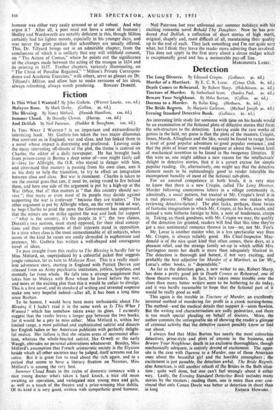Fiction
Is THIS WHAT I WANTED ? is an important and extraordinarily interesting book. Mr. Guthrie has taken the two major dilemmas that confront us in England, war and class, and has linked them in a novel whose impact is distressing and profound. Leaving aside the many interesting off-shoots of the plot, the theme is centred on Charles, the editor of a daily newspaper. He has brought back from prison-camp in Burma a deep sense of—one might fairly call it—love for Allbright, the O.R. who, stayed in danger with him, and convinced that mastery is passing from his own class, sees it as his duty to help the transition, to try to effect an integration between class and class. But war is imminent. Charles is taken to see the coastal guns that can, if need be, swing round to fire behind them, and here one side of the argument is put by a high-up at the War Office, that al! that matters is " that this country should sur- vive "; that many or even most of its people may decide against supporting the war is irrelevant " because they are traitors." The other argument is put by Allbright when, on the very brink of war, he begs Charles to print the news the Government, has suppressed, that the miners are on strike against the war and look for support —" what is the country, it's the people, in it "; the two classes, Disraeli's two nations, must stand opposed, for their ideal concep- tions and their conceptions of their interests stand in opposition. In a time when class is the most unmentionable of all subjects, when issues of the kind he raises are cosily shrouded in euphemism and pretence, Mr. Guthrie has written a well-shaped and courageous novel of ideas.
To pass straight from this reality to The Blessing is hardly fair to Miss- Mitford, so, unprejudiced by a colourful jacket that suggests jungle romance, let us turn to Malayan Rose. This is a really excel- lent adventure story, starting in England with Patrick Derrex just released from an Army psychiatric institution, jobless, hopeless, and mentally far from whole. He falls into a strange assignment that takes him to Malaya with Rose whom he loved before the war, and more of the exciting plot than this it would be unfair to divulge. This is a first novel, and its standard of writing and invented suspense make one very hopeful indeed—after all, it has been a long time since Buchan.
To be honest, I would have been more enthusiastic about The Blessing if I hadn't read it in the same week as Is This What 1 Wanted? which hai somehow taken away • its gloss. I earnestly suggest that the reader leaves a longer gap between the two books, for it would be a pity to miss either. Miss Mitford is, within her limited range, a most polished and sophisticated satirist and dissects her English ladies or her American publicists with perfectly delight- ful malice. Her failure is that she retains areas of sacrosanct affec- tion, whereas the whole-hearted satirist, like Orwell or the early Waugh, obtrudes no personal admirations whatsoever. Besides, Miss Mitford's assumption that French aristocratic society is the Elysium beside which all other societies may be judged, itself screams out for satire. But it is great fun to read about the rich again, and in a period that seems to have a literary fixation on Nannies, Miss Mitford's is among the very best.
Summer Cloud floats in the realm of domestic romance with a nice young doctor who's taken a hard knock, a nice old mum awaiting an operation, and variegated nice young men and girls, as well as a touch of, the theatre and a prize-winning blue dahlia. Of its kind it is very good, written with sympathetic good humour. Neil -Paterson last year enlivened our summer holidays with his exciting romantic novel Behold Thy Daughter. Now he has pro- duced And Delilah, a collection of, short stories of high merit, original, shapely and, most difficult of all, maintaining their quality up to the end of each. They lack something and I'm not quite sure what, but I think they leave the reader more admiring than involved. This does not apply to the first story about a circus midget which is exceptionally good and has a memorable pay-off line.
MARGHANITA LASKI. -






























 Previous page
Previous page